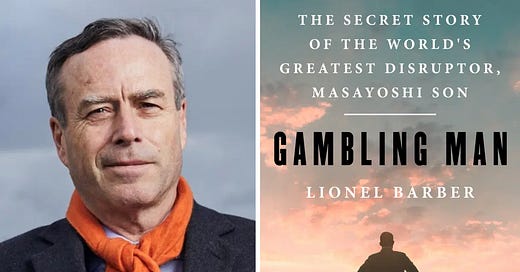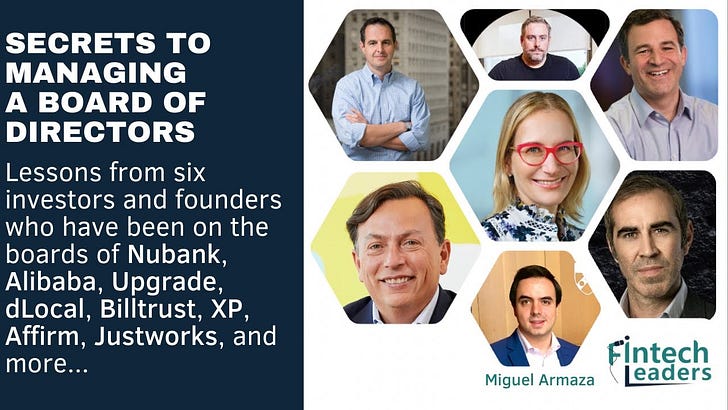The Secret Story of Softbank’s Masayoshi Son - Lionel Barber
Miguel Armaza interviews Lionel Barber, former editor of the Financial Times and author of Gambling Man: The Secret Story of the World's Greatest Disruptor, Masayoshi Son.
This article is part of Fintech Leaders, a newsletter with 70,000+ builders, entrepreneurs, investors, regulators, and students of financial services. I invite you to share and sign up. If you enjoy this conversation, please consider leaving a review on Apple, Spotify, or Youtube.
In this episode, I welcome Lionel Barber, former editor of the Financial Times and author of Gambling Man: The Secret Story of the World's Greatest Disruptor, Masayoshi Son. We met in NYC's SoHo on a freezing winter day for a fascinating conversation about his book detailing the incredible story of SoftBank's Masa - a man who seems to me like a Forrest Gump figure living in a Kafka novel - always present at pivotal moments in tech history while navigating a surreal landscape of obstacles.
After 14 years at the helm of the FT, one of the world's most prestigious publications, Lionel turned his attention to chronicling SoftBank founder Masayoshi Son's extraordinary life. As a journalist who previously interviewed world leaders including Donald Trump, Barack Obama, and Vladimir Putin, Lionel brought his experience to this project, spending nearly five years researching and interviewing over 150 people for the book, including Masa himself. His book delivers a compelling portrait of a Korean-Japanese outsider who overcame discrimination to become one of Japan's richest individuals.
From Masa's beginnings in a Japanese shantytown, to his transformative experience in America at age 16, to eventually raising the $100 billion SoftBank Vision Fund, Lionel's excellent writing captures the journey of a man who became one of the earliest investors in Yahoo and Alibaba, and who played a pivotal role in bringing tech entrepreneurship to Japan.
Please keep in mind the audio of this episode was unfortunately damaged, but we were able to salvage most of the interview. My apologies, but I hope you enjoy the clips below!
Masa Grew up an Outsider in Japan
"He couldn't get credit because he was Korean. So it's a pretty amazing story that somebody who was really in the fringes of society became one of Japan's richest men, if not the richest."
Born to Korean-Japanese parents in 1957, Masayoshi Son grew up on the edge of a shantytown in post-war Japan. His family faced severe discrimination as ethnic Koreans, with his grandfather arriving as an economic migrant in the early 1900s. After briefly returning to Korea post WWII, the family was treated so poorly they moved back to Japan despite its devastation. Masa's father hustled his way from bootlegger to loan shark to successful pachinko gambling operator - entrepreneurial grit that clearly was passed on and influenced his son. Masa entered the Japanese software business at a very young age, where he faced continued obstacles, including being denied credit because of his Korean heritage. His rise from a marginalized outsider to one of Japan's wealthiest individuals makes his success even more impressive.
Moving to California at age 16 Liberated Masa
"The Korean Japanese usually use a Japanese alias. To hide. They're living undercover, but they seem Japanese because they've got Japanese names, but they're actually real aliases. And that was true of Masayoshi Son. His Japanese name alias was Yasumoto. But when he went to California, he dropped that, and he was known as John."
Masa's move to California at age 16 proved transformative for the Korean-Japanese teenager. In 1970s America, particularly progressive California, he experienced a profound liberation from the cultural constraints of Japan. It was a shock of joy for him. For the first time, he could shed his Japanese alias "Yasumoto" – a common practice among Korean-Japanese who lived "undercover" in Japanese society – and simply go by "John." This experience in a society that welcomed diversity showed Masa a different model of belonging, one where people from various backgrounds could openly express their identities without hiding. Here he found his voice and, many could argue, he found himself. The contrast between Japan's rigid social hierarchy, where his Korean heritage relegated him to second-class status, and America's more accepting environment, fundamentally reshaped his worldview and contributed to his drive.
Trump + Masa = Billions
Mas has built a strong relationship with President Trump over the last decade. Their interactions are an example of how two masterful marketers create incredible media moments. After Trump's 2016 win, Masa leveraged casino mogul Sheldon Adelson's connections to secure a presidential meeting. The SoftBank founder pitched his vision — 50,000 jobs and $50 billion in investments in America — and Trump immediately recognized the headline potential and announced it to the world in the Trump Tower lobby as part of an announcement that caught even Masa's investors by surprise. Eight years later, the playbook has repeated itself with perfect timing with an even bolder vision: $500 billion for AI infrastructure with Oracle's Ellison and OpenAI's Altman.
Is Masayoshi Son a Statesman-like Figure?
"He's very good at making people think that he's written off, but actually he's plotting a comeback. So he's a great devotee of Sun Tzu's Art of War. So I would say he's more influential than powerful."
While Masa shares certain traits with world leaders, he doesn't quite fit the statesman mold according to Lionel Barber, who has interviewed political heavyweights like Obama, Trump, and Putin. Barber portrays Masa as a chameleon who "can play many different roles" – from jester to serious thinker – but lacks strong political instincts. Unlike traditional politicians who build public personas, Masa cultivates privacy, keeping details about his home and family closely guarded. His approach to power is distinctly different too – rather than overt displays of authority, Masa strategically "hides his power" and employs Sun Tzu-like tactics, allowing rivals to underestimate him while he plots his comeback. According to Lionel, Masa is a figure who wields influence rather than conventional political power.
Masa and Softbank Have Survived Multiple Near Death Experiences
"He had hepatitis B when he was in his early twenties and was given five years to live. So if you get through that you think, I can come back from anything."
Masayoshi Son's career has been defined by spectacular rises, catastrophic falls, and phoenix-like resurrections that have shaped his approach to risk and resilience. His first brush with mortality came in his twenties when he was diagnosed with hepatitis B and was given just five years to live – a death sentence he overcame through subjecting himself to pioneering medical treatment in the early 1980s. This survival story has translated to his business approach, where Softbank has weathered financial near-death experiences that would have destroyed most teams and executives. The most extreme example is the dot-com crash, which obliterated 97% of his personal wealth, yet Masa clawed his way back. More recently, during the pandemic, Masa and Softbank nearly capsized again after losing billions in options trading but then coming back again.
Masa, The Empire Builder
"He sees himself as a great Empire builder and he really does want to cement his place in history."
Masayoshi Son's vision of himself transcends the typical tech mogul comparison, revealing a man whose ambitions are more imperial than entrepreneurial. When activist hedge fund Elliott Management took a stake in SoftBank and delivered a presentation suggesting governance changes that could make him "as successful as Mark Zuckerberg," Masa's response was telling and kinda funny. He flatly rejected comparisons to Zuckerberg or Gates, instead likening himself to history's great conquerors: "I'm like Napoleon or Emperor Qing. Or Genghis Khan."
The Key to Great Interviews, From the Former FT Editor
"Don't fill the silence. If you're interviewing somebody, you've got to let them speak. Don't interrupt. And if there is a silence, just wait. Now that requires a certain self-discipline. But you'd be amazed if you wait, people then feel that they need to fill the silence and then you find out much more."
Having learned from decades of experience interviewing world leaders from Putin to Obama, Lionel Barber's approach to high-profile interviews combines thorough preparation with strategic patience. When initially denied access to Masa in Tokyo, Barber didn't simply give up – he invested time visiting Masa's childhood home, school, and neighborhood, developing a contextual understanding that impressed Masa later on. Beyond preparation, Barber talks about the power of silence as an interviewing technique. As an interviewer, rather than nervously filling conversational gaps or interrupting, he tells people to let the silence hang until the subject feels compelled to fill it, often revealing far more than they intended. His third principle involves establishing the right tone from the outset – approaching subjects as a serious conversationalist rather than an adversarial "Grand Inquisitor," creating an atmosphere where substantive exchange can flourish.
Want more podcast episodes? Join me and follow Fintech Leaders today on Apple, Spotify, or your favorite podcast app for weekly conversations with today’s global leaders that will dominate the 21st century in fintech, business, and beyond.













Excelente